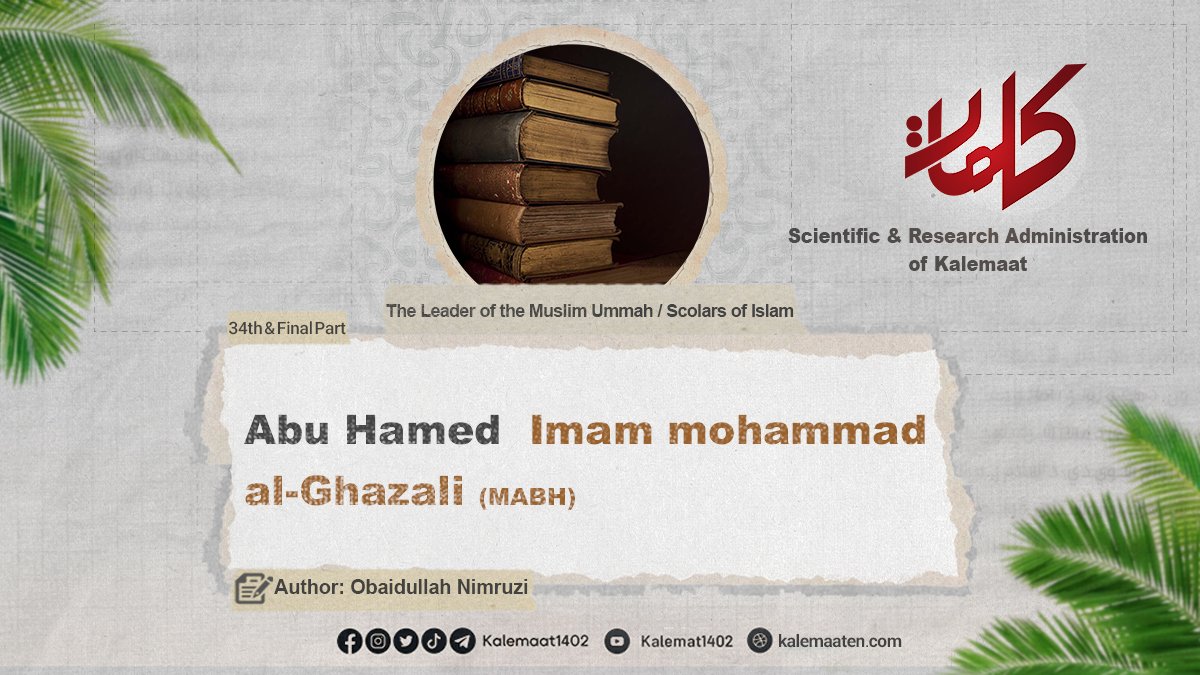
Author: Obaidullah Nimruzi
The Biography of Abu Hamed Imam Mohammad al-Ghazali [MABH] (the 34th and final part)
Practical Impacts of Imam Ghazali’s Biography on Islamic Societies
In addition to the scientific and intellectual dimensions, Imam Ghazali (MABH) always paid special attention to the practical aspects of religion and Islamic sociology. He believed that knowledge should be combined with action so that an individual can achieve human perfection. This vision of Imam Ghazali (MABH) is especially seen in his works such as “Ihya’ Ulum al-Din”. He paid attention to reforming the individual and social behavior of Muslims and urged them to purify themselves and avoid moral evils such as hypocrisy, arrogance, love of position and worldly corruption, in addition to acquiring knowledge. This approach of his led to the biography of Imam Ghazali (MABH) being recognized among Muslims as a model of combining knowledge and practice.
Imam Ghazali (MABH) and strengthening Islamic identity
Imam Ghazali (MABH) was able to strengthen Islamic identity against external intellectual and philosophical pressures by taking a comprehensive view of the religion of Islam and emphasizing the unity of reason and revelation. He paved the way for a return to the original sources of religion and a correct understanding of Islamic principles by criticizing Greek philosophies and the rationalist thinking that was prevalent in the Islamic world at that time. These influences can be seen throughout history to this day in the Islamic world. Imam Ghazali (MABH) reminded Muslims by emphasizing moral, theological, and jurisprudential teachings that a correct understanding of religion is possible not only through reason, but also by appealing to the heart and paying attention to inner and spiritual reasons.
Biography of Imam Ghazali (MABH) in intellectual and philosophical criticism
Imam Ghazali (MABH) was one of the greatest critics of Greek philosophy and the Masha’i school, and in this regard he had a significant impact on the history of Islamic philosophy. In his book “Tahafat al-Falasifah”, he scientifically and philosophically criticized thinkers such as Ibn Sina and al-Farabi who tried to adapt Greek philosophy to the religion of Islam. Ghazali concluded that some concepts of Greek philosophy were incompatible with the principles of Islam, especially in the fields of metaphysics and the proving of Allah. This criticism of his was influential not only in the Islamic world but also in the West and played an important role in redefining the relationship between reason and faith in Islamic philosophy.
Imam Ghazali (MABH) and social solutions
Another prominent aspect of Imam Ghazali’s (MABH) life was his attention to social reforms and efforts to create an Islamic society in which piety, justice, and morality prevailed. In his works, especially in “Ihya’ Ulum al-Din”, concepts such as poverty, hypocrisy, love of wealth and position are effectively criticized. Ghazali advised that individuals should purify themselves and avoid falling into worldly traps and its deceptions. He believed that only in this way can a just and Islamic society be achieved. In addition, Ghazali emphasized Islamic principles in explaining the relationship between scholars and rulers, especially in the field of consultation and poetry, and stated that social justice is possible if rulers benefit from the advice of religious scholars and strive to protect the rights of the people.
Imam Ghazali, MABH, and the establishment of the educational school
In the educational sector, Imam Ghazali, MABH, was one of the greatest moral teachers in the history of Islam. He presented new methods for the spiritual and educational development of Muslims by writing books such as “Ihya’ Ulum al-Din”, which had a great impact on individual and social education. Ghazali particularly emphasized the importance of individual morality and human interaction, and believed that change in society begins first with the reformation of the individual. Therefore, an individual must take the path of knowing Allah and refining the soul in order to be able to positively influence society. In this regard, Ghazali considered it necessary to be aware of human moral weaknesses and called on them to take stock of their egos and fight against their egos.
Imam Ghazali (MABH) and confronting deviant currents
Imam Ghazali (MABH) faced various intellectual currents during his lifetime, some of which had created deviations in the religion of Islam. He stood up against the Batiniyah groups and various intellectual currents and defended the truth with his sharp pen and scientific language. Ghazali challenged these groups and criticized deviant perceptions of religion in his works, especially in “Faza’ih al-Batiniyah”. He also defended more reductionist approaches to understanding religion and cosmology in Islam by attacking Greek philosophies and rationalist theories.
Overall, Imam Ghazali (MABH) created a profound transformation in the Islamic world with his extensive and influential works. He not only criticized and analyzed philosophical and theological ideas but also played a significant role in the field of social and moral reforms. Imam Ghazali’s views on combining reason and faith, individual and social reform, and creating an Islamic and justice-oriented society are still applicable in today’s world. Imam Ghazali’s biography (MABH) is still considered a divine model for Muslims and even non-Muslim thinkers in various scientific, philosophical, theological, and social aspects.
Continues…


